新概念英语第四册课文翻译及学习笔记:Lesson33.doc
新概念英语第四册课文翻译及学习笔记:Lesson33
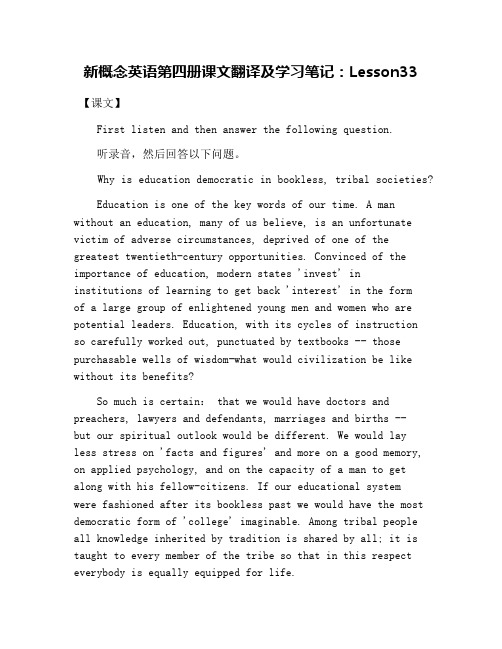
新概念英语第四册课文翻译及学习笔记:Lesson33【课文】First listen and then answer the following question.听录音,然后回答以下问题。
Why is education democratic in bookless, tribal societies?Education is one of the key words of our time. A man without an education, many of us believe, is an unfortunate victim of adverse circumstances, deprived of one of the greatest twentieth-century opportunities. Convinced of the importance of education, modern states 'invest' ininstitutions of learning to get back 'interest' in the formof a large group of enlightened young men and women who are potential leaders. Education, with its cycles of instruction so carefully worked out, punctuated by textbooks -- those purchasable wells of wisdom-what would civilization be like without its benefits?So much is certain: that we would have doctors and preachers, lawyers and defendants, marriages and births --but our spiritual outlook would be different. We would lay less stress on 'facts and figures' and more on a good memory, on applied psychology, and on the capacity of a man to get along with his fellow-citizens. If our educational system were fashioned after its bookless past we would have the most democratic form of 'college' imaginable. Among tribal people all knowledge inherited by tradition is shared by all; it is taught to every member of the tribe so that in this respect everybody is equally equipped for life.It is the ideal condition of the 'equal start' which only our most progressive forms of modern education try to regain. In primitive cultures the obligation to seek and to receive the traditional instruction is binding to all. There are no 'illiterates' -- if the term can be applied to peoples without a script -- while our own compulsory school attendance became law in Germany in 1642, in France in 1806, and in England in 1876, and is still non-existent in a number of 'civilized' nations. This shows how long it was before we deemed it necessary to make sure that all our children could share in the knowledge accumulated by the 'happy few' during the past centuries.Education in the wilderness is not a matter of monetary means. All are entitled to an equal start. There is none of the hurry which, in our society, often hampers the full development of a growing personality. There, a child grows up under the ever-present attention of his parent; therefore the jungles and the savannahs know of no 'juvenile delinquency'. No necessity of making a living away from home results in neglect of children, and no father is confronted with his inability to 'buy' an education for his child.JULIUS E. LIPS The Origin of Things【New words and expressions 生词和短语】adverse adj. 不利的purchasable adj.可买到的preacher n. 传教士defendant n. 被告outlook n. 视野capacity n. 水平democratic adj. 民主的tribal n. 部落的tribe n. 部落illiterate n. 文盲compulsory adj. 义务的deem v. 认为means n. 方法,手段,财产,资力hamper v. 妨碍savannah n. 大草原juvenile adj. 青少年delinquency n. 犯罪【课文注释】1.adverse adj. 不利的, 逆向的, 有害的例句: The development was adverse to our interests.这种发展与我们的利益背道而驰。
新概念英语青少版第四册第33课:Theunderground

Lesson 33 The underground第33课地铁Gretel loves the underground in London.格莱托喜欢伦敦的地铁.She always prefers to travel on the underground because it's very fast.她总喜欢乘地铁,因为它速度很快.She doesn't find it difficult now,as she's got used to it.现在她乘地铁不感到困难,因为她已经习惯了.Gretel knows the underground map very well.格莱托对地铁的路线⼗分熟悉.Each line has its own colour.各条路线都有⾃⼰的颜⾊.For instance,the Central Line is red;例如,中央线是红⾊的;the Piccadilly Line is blue,and so on.⽪卡迪利线是蓝⾊的,等等.Londoners always refer to the underground as "the tube".伦敦⼈管地铁叫"隧道".When you see the long tunnels,当你见到那些长长的隧道,it isn't hard to understand why.你就不难理解⼈们为什么这样称呼它.Yesterday.Gretel went home on the underground at about five o'clock in the afternoon.昨天,格莱托乘地铁回家在下午⼤约5:00的时候.She got a surprise.她⼤吃⼀惊.Since everyone was going home from work,因为⼤家都下班回家,the trains were full.车厢挤得满满的.This was the"rush hour"--and it was a new experience for Gretel.这是⾼峰时间对格莱托说,这⼜是个新的经历.There were a lot of people but trains arrived every minute.⼈很多,但每分钟就有⼀班车.Everyone waited patiently and didn't push.⼤家耐⼼等待,没⼈拥挤.As her train was full,Gretel had to stand,but she didn't mind.由于她乘的车满载,格莱托只能站着,不过她并不在乎.In the train she saw a notice which said:在车上她看到⼀个布告,上⾯写着:"Avoid the Rush Hour"."避开⾼峰时间."I will,next time,Gretel thought!格莱托想,"下次我⼀定这么做."。
新概念英语第四册笔记-完整版
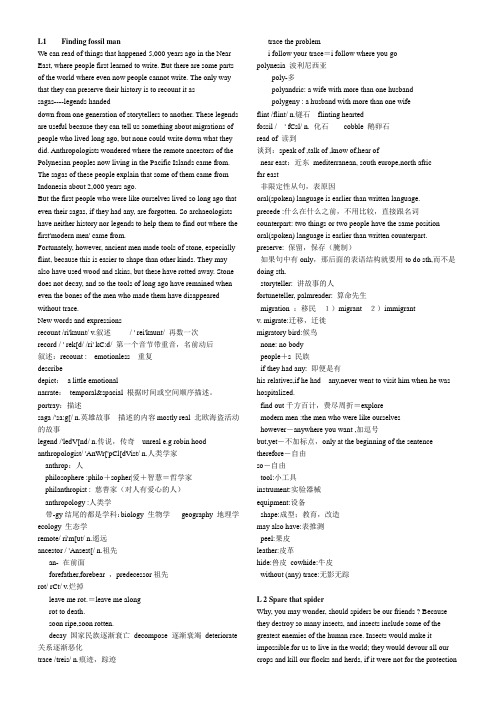
L1 Finding fossil manWe can read of things that happened 5,000 years ago in the Near East, where people first learned to write. But there are some parts of the world where even now people cannot write. The only way that they can preserve their history is to recount it assagas----legends handeddown from one generation of storytellers to another. These legends are useful because they can tell us something about migrations of people who lived long ago, but none could write down what they did. Anthropologists wondered where the remote ancestors of the Polynesian peoples now living in the Pacific Islands came from. The sagas of these people explain that some of them came from Indonesia about 2,000 years ago.But the first people who were like ourselves lived so long ago that even their sagas, if they had any, are forgotten. So archaeologists have neither history nor legends to help them to find out where the first'modern men' came from.Fortunately, however, ancient men made tools of stone, especially flint, because this is easier to shape than other kinds. They may also have used wood and skins, but these have rotted away. Stone does not decay, and so the tools of long ago have remained when even the bones of the men who made them have disappeared without trace.New words and expressionsrecount /ri'kaunt/ v.叙述/ ' rei'kaunt/ 再数一次record / ' rek[d/ /ri' kC:d/ 第一个音节带重音,名前动后叙述:recount : emotionless 重复describedepict:a little emotionalnarrate:temporal&spacial 根据时间或空间顺序描述。
新概念英语第4册课文及译文
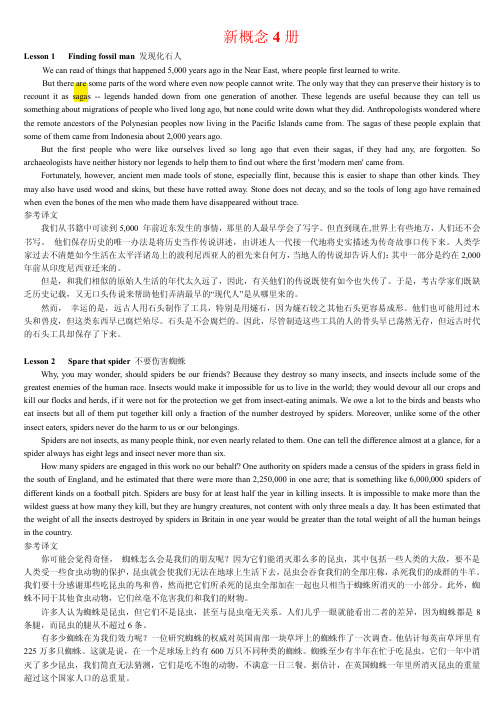
但是�和我们相似的原始人生活的年代太久远了�因此�有关他们的传说既使有如今也失传了。于是�考古学家们既缺
乏历史记载�又无口头传说来帮助他们弄清最早的“现代人”是从哪里来的。 然而� 幸运的是�远古人用石头制作了工具�特别是用燧石�因为燧石较之其他石头更容易成形。他们也可能用过木
头和兽皮�但这类东西早已腐烂殆尽。石头是不会腐烂的。因此�尽管制造这些工具的人的骨头早已荡然无存�但远古时代
新概念 4 册
Lesson 1 Finding fossil man 发现化石人 We can read of things that happened 5,000 years ago in the Near East, where people first learned to write. But there are some parts of the word where even now people cannot write. The only way that they can preserve their history is to
recount it as sagas -- legends handed down from one generation of another. These legends are useful because they can tell us something about migrations of people who lived long ago, but none could write down what they did. Anthropologists wondered where the remote ancestors of the Polynesian peoples now living in the Pacific Islands came from. The sagas of these people explain that some of them came from Indonesia about 2,000 years ago.
新概念英语第四册课文及翻译
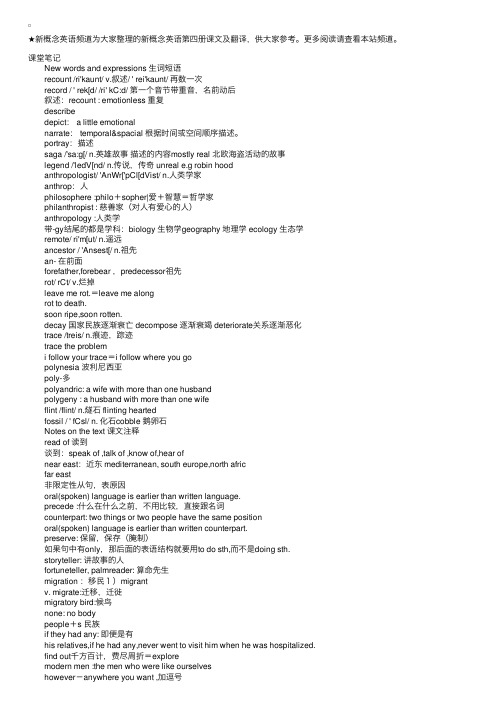
★新概念英语频道为⼤家整理的新概念英语第四册课⽂及翻译,供⼤家参考。
更多阅读请查看本站频道。
课堂笔记 New words and expressions ⽣词短语 recount /ri'kaunt/ v.叙述/ ' rei'kaunt/ 再数⼀次 record / ' rek[d/ /ri' kC:d/ 第⼀个⾳节带重⾳,名前动后 叙述:recount : emotionless 重复 describe depict: a little emotional narrate: temporal&spacial 根据时间或空间顺序描述。
portray:描述 saga /'sa:g[/ n.英雄故事描述的内容mostly real 北欧海盗活动的故事 legend /'ledV[nd/ n.传说,传奇 unreal e.g robin hood anthropologist/ 'AnWr['pCl[dVist/ n.⼈类学家 anthrop:⼈ philosophere :philo+sopher|爱+智慧=哲学家 philanthropist : 慈善家(对⼈有爱⼼的⼈) anthropology :⼈类学 带-gy结尾的都是学科:biology ⽣物学geography 地理学 ecology ⽣态学 remote/ ri'm[ut/ n.遥远 ancestor / 'Ansest[/ n.祖先 an- 在前⾯ forefather,forebear ,predecessor祖先 rot/ rCt/ v.烂掉 leave me rot.=leave me along rot to death. soon ripe,soon rotten. decay 国家民族逐渐衰亡 decompose 逐渐衰竭 deteriorate关系逐渐恶化 trace /treis/ n.痕迹,踪迹 trace the problem i follow your trace=i follow where you go polynesia 波利尼西亚 poly-多 polyandric: a wife with more than one husband polygeny : a husband with more than one wife flint /flint/ n.燧⽯ flinting hearted fossil / ' fCsl/ n. 化⽯cobble 鹅卵⽯ Notes on the text 课⽂注释 read of 读到 谈到:speak of ,talk of ,know of,hear of near east:近东 mediterranean, south europe,north afric far east ⾮限定性从句,表原因 oral(spoken) language is earlier than written language. precede :什么在什么之前,不⽤⽐较,直接跟名词 counterpart: two things or two people have the same position oral(spoken) language is earlier than written counterpart. preserve: 保留,保存(腌制) 如果句中有only,那后⾯的表语结构就要⽤to do sth,⽽不是doing sth. storyteller: 讲故事的⼈ fortuneteller, palmreader: 算命先⽣ migration :移民1)migrant v. migrate:迁移,迁徙 migratory bird:候鸟 none: no body people+s 民族 if they had any: 即便是有 his relatives,if he had any,never went to visit him when he was hospitalized. find out千⽅百计,费尽周折=explore modern men :the men who were like ourselves however-anywhere you want ,加逗号 but,yet-不加标点,only at the beginning of the sentence therefore-⾃由 so-⾃由 tool:⼩⼯具 instrument:实验器械 equipment:设备 shape:成型;教育,改造 may also have:表推测 peel:果⽪ leather:⽪⾰ hide:兽⽪ cowhide:⽜⽪ without (any) trace:⽆影⽆踪。
新概念英语四册课堂笔记 Lesson 33-The Raising of the Vasa
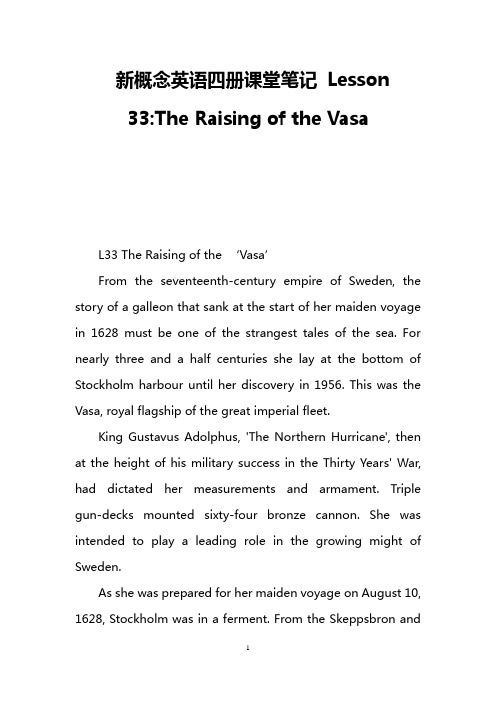
新概念英语四册课堂笔记Lesson33:The Raising of the VasaL33 The Raising of the ‘Vasa’From the seventeenth-century empire of Sweden, the story of a galleon that sank at the start of her maiden voyage in 1628 must be one of the strangest tales of the sea. For nearly three and a half centuries she lay at the bottom of Stockholm harbour until her discovery in 1956. This was the Vasa, royal flagship of the great imperial fleet.King Gustavus Adolphus, 'The Northern Hurricane', then at the height of his military success in the Thirty Years' War, had dictated her measurements and armament. Triple gun-decks mounted sixty-four bronze cannon. She was intended to play a leading role in the growing might of Sweden.As she was prepared for her maiden voyage on August 10, 1628, Stockholm was in a ferment. From the Skeppsbron andsurrounding islands the people watched this thing of beauty begin to spread her sails and catch the wind. They had laboured for three years to produce this floating work of art; she was more richly carved and ornamented than any previous ship. The high stern castle was a riot of carved gods, demons, knights, kings, warriors,mermaids, cherubs; and zoomorphic animal shapes ablaze with red and gold and blue, symbols of courage, power, and cruelty, were portrayed to stir the imaginations of the superstitious sailors of the day.Then the cannons of the anchored warships thundered a salute to which the Vasa fired in reply. As she emerged from her drifting cloud of gun smoke with the water churned to foam beneath her bow, her flags flying, pennants waving, sails filling in the breeze, and the red and gold of her superstructure ablaze with colour, she presented a more majestic spectacle than Stockholmers had ever seen before. All gun-ports were open and the muzzles peeped wickedly from them.As the wind freshened there came a sudden squall and the ship made a strange movement, listing to port. The Ordnance Officer ordered all the port cannon to be heaved to starboard to counteract the list, but the steepening angle of the decksincreased. Then the sound of rumbling thunder reached the watchers on the shore, as cargo, ballast, ammunition and 400 people went sliding and crashing down to the port side of the steeply listing ship. The lower gun-ports were now below water and the inrush sealed the ship's fate. In that first glorious hour, the mighty Vasa, which was intended to rule the Baltic, sank with all flags flying—in the harbour of her birth.。
新概念英语85年上外美音版第四册 第33课:The Raising of the Vasa
新概念英语85年上外美音版第四册第33课:TheRaising of the VasaLesson 33 The Raising of the Vasa “瓦萨”号出水From the seventeenth-century empire of Sweden, the storyof a galleon that sank at the start of her maiden voyage in 1628 must be one of the strangest tales of the sea. Fornearly three and a half centuries she lay at the bottom of Stockholm harbour until her discovery in 1956. This was the Vasa, royal flagship of the great imperial fleet.King Gustavus Adolphus, 'The Northern Hurricane', then at the height of his military success in the Thirty Years' War, had dictated her measurements and armament. Triple gun-decks mounted sixty-four bronze cannon. She was intended to play a leading role in the growing might of Sweden.As she was prepared for her maiden voyage on August 10, 1628, Stockholm was in a ferment. From the Skeppsbron and surrounding islands the people watched this thing of beauty begin to spread her sails and catch the wind. They had laboured for three years to produce this floating work of art; she was more richly carved and ornamented than any previous ship. The high stern castle was a riot of carved gods, demons, knights, kings, warriors,mermaids, cherubs; and zoomorphic animal shapes ablaze with red and gold and blue, symbols of courage, power, and cruelty, were portrayed to stir the imaginations of the superstitious sailors of the day.Then the cannons of the anchored warships thundered a salute to which the Vasa fired in reply. As she emerged fromher drifting cloud of gun smoke with the water churned to foam beneath her bow, her flags flying, pennants waving,sails filling in the breeze, and the red and gold of her superstructure ablaze with colour, she presented a more majestic spectacle than Stockholmers had ever seen before.All gun-ports were open and the muzzles peeped wickedly from them.As the wind freshened there came a sudden squall and the ship made a strange movement, listing to port. The Ordnance Officer ordered all the port cannon to be heaved to starboard to counteract the list, but the steepening angle of the decks increased. Then the sound of rumbling thunder reached the watchers on the shore, as cargo, ballast, ammunition and 400 people went sliding and crashing down to the port side of the steeply listing ship. The lower gun-ports were now below water and the inrush sealed the ship's fate. In that first glorious hour, the mighty Vasa, which was intended to rule the Baltic, sank with all flags flying-in the harbour of her birth.。
新概念第四册课文翻译及学习笔记:Lesson33
【课⽂】 First listen and then answer the following question. 听录⾳,然后回答以下问题。
Why is education democratic in bookless, tribal societies? Education is one of the key words of our time. A man without an education, many of us believe, is an unfortunate victim of adverse circumstances, deprived of one of the greatest twentieth-century opportunities. Convinced of the importance of education, modern states 'invest' in institutions of learning to get back 'interest' in the form of a large group of enlightened young men and women who are potential leaders. Education, with its cycles of instruction so carefully worked out, punctuated by textbooks -- those purchasable wells of wisdom-what would civilization be like without its benefits? So much is certain: that we would have doctors and preachers, lawyers and defendants, marriages and births -- but our spiritual outlook would be different. We would lay less stress on 'facts and figures' and more on a good memory, on applied psychology, and on the capacity of a man to get along with his fellow-citizens. If our educational system were fashioned after its bookless past we would have the most democratic form of 'college' imaginable. Among tribal people all knowledge inherited by tradition is shared by all; it is taught to every member of the tribe so that in this respect everybody is equally equipped for life. It is the ideal condition of the 'equal start' which only our most progressive forms of modern education try to regain. In primitive cultures the obligation to seek and to receive the traditional instruction is binding to all. There are no 'illiterates' -- if the term can be applied to peoples without a script -- while our own compulsory school attendance became law in Germany in 1642, in France in 1806, and in England in 1876, and is still non-existent in a number of 'civilized' nations. This shows how long it was before we deemed it necessary to make sure that all our children could share in the knowledge accumulated by the 'happy few' during the past centuries. Education in the wilderness is not a matter of monetary means. All are entitled to an equal start. There is none of the hurry which, in our society, often hampers the full development of a growing personality. There, a child grows up under the ever-present attention of his parent; therefore the jungles and the savannahs know of no 'juvenile delinquency'. No necessity of making a living away from home results in neglect of children, and no father is confronted with his inability to 'buy' an education for his child. JULIUS E. LIPS The Origin of Things 【New words and expressions ⽣词和短语】 adverse adj. 不利的 purchasable adj.可买到的 preacher n. 传教⼠ defendant n. 被告 outlook n. 视野 capacity n. 能⼒ democratic adj. 民主的 tribal n. 部落的 tribe n. 部落 illiterate n. ⽂盲 compulsory adj. 义务的 deem v. 认为 means n. ⽅法,⼿段,财产,资⼒ hamper v. 妨碍 savannah n. ⼤草原 juvenile adj. 青少年 delinquency n. 犯罪 【课⽂注释】 1.adverse adj. 不利的, 逆向的, 有害的 例句: The development was adverse to our interests. 这种发展与我们的利益背道⽽驰。
新概念第四册课文翻译及学习笔记:Lesson33
新概念第四册课文翻译及学习笔记:Lesson33【课文】First listen and then answer the following question.听录音,然后回答以下问题。
Why is education democratic in bookless, tribal societies?Education is one of the key words of our time. A man without an education, many of us believe, is an unfortunate victim of adverse circumstances, deprived of one of the greatest twentieth-century opportunities. Convinced of the importance of education, modern states 'invest' in institutions of learning to get back 'interest' in the form of a large group of enlightened young men and women who are potential leaders. Education, with its cycles of instruction so carefully worked out, punctuated by textbooks -- those purchasable wells of wisdom-what would civilization be like without its benefits?So much is certain: that we would have doctors and preachers, lawyers and defendants, marriages and births -- but our spiritual outlook would be different. We would lay less stress on 'facts and figures' and more on a good memory, on applied psychology, and on the capacity of a man to get along with his fellow-citizens. If our educational system were fashioned after its bookless past we would have the most democratic form of 'college' imaginable. Among tribal people all knowledge inherited by tradition is shared by all; it is taught to every member of the tribe so that in this respect everybody is equally equipped for life.It is the ideal condition of the 'equal start' which only our most progressive forms of modern education try to regain. Inprimitive cultures the obligation to seek and to receive the traditional instruction is binding to all. There are no 'illiterates' -- if the term can be applied to peoples without a script -- while our own compulsory school attendance became law in Germany in 1642,in France in 1806, and in England in 1876, and is still non-existent in a number of 'civilized' nations. This shows how long it was before we deemed it necessary to make sure that all our children could share in the knowledge accumulated by the 'happy few' during the past centuries.Education in the wilderness is not a matter of monetary means.All are entitled to an equal start. There is none of the hurry which, in our society, often hampers the full development of a growing personality. There, a child grows up under the ever-present attention of his parent; therefore the jungles and the savannahs know of no'juvenile delinquency'. No necessity of making a living away from home results in neglect of children, and no father is confronted with his inability to 'buy' an education for his child.JULIUS E. LIPS The Origin of Things【New words and expressions 生词和短语】adverse adj. 不利的purchasable adj.可买到的preacher n. 传教士defendant n. 被告outlook n. 视野capacity n. 能力democratic adj. 民主的tribal n. 部落的tribe n. 部落illiterate n. 文盲compulsory adj. 义务的deem v. 认为means n. 方法,手段,财产,资力hamper v. 妨碍savannah n. 大草原juvenile adj. 青少年delinquency n. 犯罪【课文注释】1.adverse adj. 不利的, 逆向的, 有害的例句: The development was adverse to our interests.这种发展与我们的利益背道而驰。
新概念第四册课文翻译及学习笔记【Lesson31、32、33】
【导语】新概念英语作为⼀套世界闻名的英语教程,以其全新的教学理念,有趣的课⽂内容和全⾯的技能训练,深受⼴⼤英语学习者的欢迎和喜爱。
为了⽅便同学们的学习,⽆忧考为⼤家整理了⾯的新概念第四册课⽂翻译及学习笔记,希望为⼤家的新概念英语学习提供帮助!Lesson31 【课⽂】 First listen and then answer the following question. 听录⾳,然后回答以下问题。
What do you have to be able to do to appreciate sculpture? Appreciation of sculpture depends upon the ability to respond to form in three dimension. That is perhaps why sculpture has been described as the most difficult of all arts; certainly it is more difficult than the arts which involve appreciation of flat forms, shape in only two dimensions. Many more people are 'form-blind' than colour-blind. The child learning to see, first distinguishes only two-dimensional shape; it cannot judge distances, depths. Later, for its personal safety and practical needs, it has to develop (partly by means of touch) the ability to judge roughly three-dimensonal distances. But having satisfied the requirements of practical necessity, most people go no further. Though they may attain considerable accuracy in the perception of flat form, they do not make the further intellectual and emotional effort needed to comprehend form in its full spatial existence. This is what the sculptor must do. He must strive continually to think of, and use, form in its full spatial completeness. He gets the solid shape, as it were, inside his head-he thinks of it, whatever its size, as if he were holding it completely enclosed in the hollow of his hand. He mentally visualizes a complex form from all round itself; he knows while he looks at one side what the other side is like, he identifies himself with its centre of gravity, its mass, its weight; he realizes its volume, as the space that the shape displaces in the air. And the sensitive observer of sculpture must also learn to feel shape simply as shape, not as description or reminiscence. He must, for example, perceive an egg as a simple single solid shape, quite apart from its significance as food, or from the literary idea that it will become a bird. And so with solids such as a shell, a nut, a plum, a pear, a tadpole, a mushroom, a mountain peak, a kidney, a carrot, a tree-trunk, a bird, a bud, a lark, a ladybird, a bulrush, a bone. From these he can go on to appreciate more complex forms or combinations of several forms. HENRY MOORE The Sculptor Speaks from The Listener 【New words and expressions ⽣词和短语】 auditory adj. 听觉的 colour-blind adj. ⾊盲的 perception n. 知觉 comprehend v. 理解 spatial adj. 空间 visualize v. 使具形象,设想 reminiscence n. 回忆,联想 tadpole n. 蝌蚪 mushroom n. 蘑菇 carrot n. 胡萝⼘ bud n. 花蕾 lark n. 云雀 ladybird n. 瓢⾍ bulrush n. 芦苇 【课⽂注释】 1.respond to 响应,对 … 起反应 例句:He resolved to respond to the call of the Party. 他决⼼响应党的号召。
- 1、下载文档前请自行甄别文档内容的完整性,平台不提供额外的编辑、内容补充、找答案等附加服务。
- 2、"仅部分预览"的文档,不可在线预览部分如存在完整性等问题,可反馈申请退款(可完整预览的文档不适用该条件!)。
- 3、如文档侵犯您的权益,请联系客服反馈,我们会尽快为您处理(人工客服工作时间:9:00-18:30)。
新概念英语第四册课文翻译及学习笔记:Lesson33 【课文】First listen and then answer the following question.听录音,然后回答以下问题。
Why is education democratic in bookless, tribal societies?Education is one of the key words of our time. A manwithout an education, many of us believe, is an unfortunatevictim of adverse circumstances, deprived of one of thegreatest twentieth-century opportunities. Convinced of theimportance of education, modern states 'invest' ininstitutions of learning to get back 'interest' in the formof a large group of enlightened young men and women whoare potential leaders. Education, with its cycles of instructionso carefully worked out, punctuated by textbooks -- those purchasable wells of wisdom-what would civilization belike without its benefits?So much is certain:that we would have doctors and preachers, lawyers and defendants, marriages and births --but our spiritual outlook would be different. We would layless stress on 'facts and figures' and more on a good memory,on applied psychology, and on the capacity of a man to getalong with his fellow-citizens. If our educational systemwere fashioned after its bookless past we would have themost democratic form of 'college' imaginable. Among tribalpeople all knowledge inherited by tradition is shared by all; it istaught to every member of the tribe so that in this respecteverybody is equally equipped for life.It is the ideal condition of the 'equal start' which onlyour most progressive forms of modern education try to regain. In primitive cultures the obligation to seek and to receivethe traditional instruction is binding to all. There are no'illiterates' -- if the term can be applied to peopleswithout a script -- while our own compulsory school attendance became law in Germany in 1642, in France in 1806, and in England in 1876, and is still non-existent in a numberof 'civilized' nations. This shows how long it was before we deemed it necessary to make sure that all our children could share in the knowledge accumulated by the 'happy few' during the past centuries.Education in the wilderness is not a matter of monetary means. All are entitled to an equal start. There is none of the hurry which, in our society, often hampers the full development of a growing personality. There, a child grows up under the ever-present attention of his parent; therefore the jungles and the savannahs know of no 'juvenile delinquency'. No necessity of making a living away from home results in neglect of children, and no father is confronted with his inability to 'buy' an education for his child.JULIUS E. LIPS The Origin of Things【New words and expressions生词和短语】adverse adj.不利的purchasable adj.可买到的preacher n.传教士defendant n.被告outlook n.视野capacity n.水平democratic adj.民主的tribal n.部落的tribe n.部落illiterate n.文盲compulsory adj.义务的deem v.认为means n. 方法,手段,财产,资力hamper v.妨碍savannah n.大草原juvenile adj.青少年delinquency n.犯罪【课文注释】1.adverse adj.不利的,逆向的,有害的例句: The development was adverse to our interests.这种发展与我们的利益背道而驰。
【词义辨析】opposite, contrary, adverse, reverse, converse这些形容词均含“相反的、对立的”之意。
opposite :指位置、方向、行动或想法等完全相反。
contrary :一般指与某种主张、看法或行为等正好相反,隐含否定一方并不意味着肯定另一方的意味。
adverse :通常指违害利益的、无生命的势力或条件等,侧重分歧。
reverse :指朝相反方向的或反面 ( 背面 ) 的。
converse :指在方向、行动或意见上相反的。
2.deprive of剥夺,使失去... (权利)例句: What will a student do if he were deprived ofhis books?一个学生如果没有了书籍,将怎么办?deprive vt v.剥夺,失去,免职例句: We have no right to deprive their life.我们没有权利去剥夺它们的生命。
【词义辨析】rob, steal, plunder, deprive这些动词均含“偷,抢,夺”之意。
rob :最常用词,指用暴力恐吓或哄骗等非法手段抢夺财物。
steal :普通用词,指暗中行窃。
plunder :指大规模或大范围地掠夺。
deprive :多指夺去或扣留别人拥有或可能拥有的有价值或必需的东西,也可用于指抽象的事物。
cation, with its cycles of instruction so carefullyworked out, punctuated by textbooks这句话中的主语Education与punctuated 并不是一种主谓关系,所以,这句话在语法上被称作单元句。
punctuate v.①加标点于例句: The children have not yet learned topunctuate correctly.这些小学生尚未学会准确使用标点符号②强调例句: He made gestures to punctuate his speech.他打手势来强调他的讲话。
③不时打断例句: He punctuated his remarks with thumps on the table.他讲话时不时地捶着桌子。
4.So much is certain[b]有承上启下的作用,一方面回答了前一段的最后一句的提问,另一方面开始列举没有教育将会给社会文明带来的影响。
5.[b]lay stress on强调(着重,重视)例句: They lay too much stress on money.他们太看重金钱了。
6.capacity n.①水平例句: He has a great capacity for learning languages.他学语言的水平很强。
②容量 ,容积例句: What is the capacity of this jug?这个水壶的容积多大 ?③职位 ,资格例句: He participated in an unofficial capacity.他参与了一个非官方的职位。
She alone was in a capacity to begin the negotiation.只有她有资格开始谈判。
